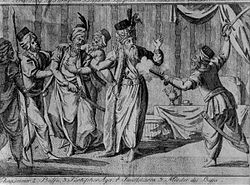Hadji Mustafa Pasha
|
Hajji Mustafa Pasha |
|
|---|---|

Hadži Mustafa Pasha's assassination by Kuchuk Alija, plate from 1802
|
|
| Native name | Hacı Mustafa Şinikoğlu Paşa |
| Nickname(s) | "Serbian mother" |
| Born | 1733 |
| Died | 15 December 1801 (aged 67–68) Belgrade, Sanjak of Smederevo, Ottoman Empire |
| Allegiance |
|
| Rank | pasha, vizier |
Hadji Mustafa Pasha (Serbo-Croatian: Hadži Mustafa-paša, Хаџи Мустафа-паша, Turkish: Hacı Mustafa Şinikoğlu Paşa; 1733—15 December 1801) was an Ottoman commander and politician of Greek Muslim origin who lived in Sanjak of Smederevo (in modern day Serbia). He fought in the Austro-Turkish War (1787–1791) and the Russo-Turkish War (1768–1774). In the period between 1793 and 1801 he was Vizier of the Sanjak of Smederevo (also known as Belgrade Pashaluk). On 15 December 1801 he was murdered by Kuchuk Alija, one of four rebel Janissary leaders (dahije) who took control over the sanjak.
Born in 1733, of Greek Muslim origin, he was surnamed Şinikoğlu (Serbo-Croatian: Šinikdžić). As hajji, he carried out a pilgrimage to Mecca and Medina, and was also a member of the Bektashi Order. He was among the notable Ottomans who had fought during the Austro-Turkish War (1787–91) and the Russo-Turkish War (1768–74).
Mustafa Pasha was the main government architect (bina emin) in the Pashalik of Belgrade before he became Vizier of the Belgrade Pashaluk in July 1793. He closely collaborated with Peter Ichko and according to some sources both of them were members of one masonic lodge. As a friend of the Serb people, he was nicknamed the "Serbian mother".
...
Wikipedia
